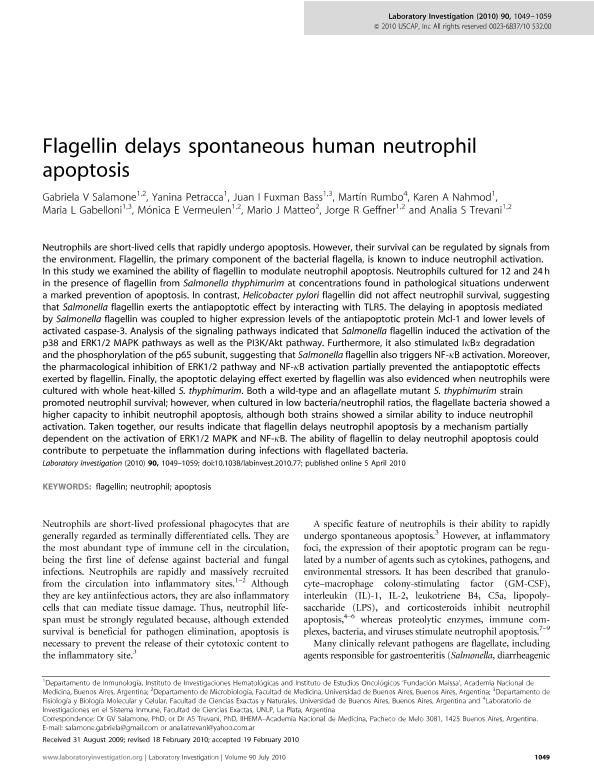Artículo
Flagellin delays spontaneous human neutrophil apoptosis
Salamone, Gabriela Veronica ; Petracca, Yanina Luján
; Petracca, Yanina Luján ; Fuxman Bass, Juan Ignacio
; Fuxman Bass, Juan Ignacio ; Rumbo, Martín
; Rumbo, Martín ; Nahmod, Karen Amelia
; Nahmod, Karen Amelia ; Gabelloni, María Laura
; Gabelloni, María Laura ; Vermeulen, Elba Monica
; Vermeulen, Elba Monica ; Matteo, Mario José; Geffner, Jorge Raúl
; Matteo, Mario José; Geffner, Jorge Raúl ; Trevani, Analía Silvina
; Trevani, Analía Silvina
 ; Petracca, Yanina Luján
; Petracca, Yanina Luján ; Fuxman Bass, Juan Ignacio
; Fuxman Bass, Juan Ignacio ; Rumbo, Martín
; Rumbo, Martín ; Nahmod, Karen Amelia
; Nahmod, Karen Amelia ; Gabelloni, María Laura
; Gabelloni, María Laura ; Vermeulen, Elba Monica
; Vermeulen, Elba Monica ; Matteo, Mario José; Geffner, Jorge Raúl
; Matteo, Mario José; Geffner, Jorge Raúl ; Trevani, Analía Silvina
; Trevani, Analía Silvina
Fecha de publicación:
07/2010
Editorial:
Nature Publishing Group
Revista:
Laboratory Investigation
ISSN:
0023-6837
Idioma:
Inglés
Tipo de recurso:
Artículo publicado
Clasificación temática:
Resumen
Neutrophils are short-lived cells that rapidly undergo apoptosis. However, their survival can be regulated by signals from the environment. Flagellin, the primary component of the bacterial flagella, is known to induce neutrophil activation. In this study we examined the ability of flagellin to modulate neutrophil apoptosis. Neutrophils cultured for 12 and 24 h in the presence of flagellin from Salmonella thyphimurim at concentrations found in pathological situations underwent a marked prevention of apoptosis. In contrast, Helicobacter pylori flagellin did not affect neutrophil survival, suggesting that Salmonella flagellin exerts the antiapoptotic effect by interacting with TLR5. The delaying in apoptosis mediated by Salmonella flagellin was coupled to higher expression levels of the antiapoptotic protein Mcl-1 and lower levels of activated caspase-3. Analysis of the signaling pathways indicated that Salmonella flagellin induced the activation of the p38 and ERK1/2 MAPK pathways as well as the PI3K/Akt pathway. Furthermore, it also stimulated IBα degradation and the phosphorylation of the p65 subunit, suggesting that Salmonella flagellin also triggers NF-B activation. Moreover, the pharmacological inhibition of ERK1/2 pathway and NF-B activation partially prevented the antiapoptotic effects exerted by flagellin. Finally, the apoptotic delaying effect exerted by flagellin was also evidenced when neutrophils were cultured with whole heat-killed S. thyphimurim. Both a wild-type and an aflagellate mutant S. thyphimurim strain promoted neutrophil survival; however, when cultured in low bacteria/neutrophil ratios, the flagellate bacteria showed a higher capacity to inhibit neutrophil apoptosis, although both strains showed a similar ability to induce neutrophil activation. Taken together, our results indicate that flagellin delays neutrophil apoptosis by a mechanism partially dependent on the activation of ERK1/2 MAPK and NF-B. The ability of flagellin to delay neutrophil apoptosis could contribute to perpetuate the inflammation during infections with flagellated bacteria.
Palabras clave:
APOPTOSIS
,
FLAGELLIN
,
NEUTROPHIL
Archivos asociados
Licencia
Identificadores
Colecciones
Articulos(CCT - LA PLATA)
Articulos de CTRO.CIENTIFICO TECNOL.CONICET - LA PLATA
Articulos de CTRO.CIENTIFICO TECNOL.CONICET - LA PLATA
Articulos(IIBBA)
Articulos de INST.DE INVEST.BIOQUIMICAS DE BS.AS(I)
Articulos de INST.DE INVEST.BIOQUIMICAS DE BS.AS(I)
Articulos(IMEX)
Articulos de INST.DE MEDICINA EXPERIMENTAL
Articulos de INST.DE MEDICINA EXPERIMENTAL
Articulos(INIGEM)
Articulos de INSTITUTO DE INMUNOLOGIA, GENETICA Y METABOLISMO
Articulos de INSTITUTO DE INMUNOLOGIA, GENETICA Y METABOLISMO
Articulos(SEDE CENTRAL)
Articulos de SEDE CENTRAL
Articulos de SEDE CENTRAL
Citación
Salamone, Gabriela Veronica; Petracca, Yanina Luján; Fuxman Bass, Juan Ignacio; Rumbo, Martín; Nahmod, Karen Amelia; et al.; Flagellin delays spontaneous human neutrophil apoptosis; Nature Publishing Group; Laboratory Investigation; 90; 7; 7-2010; 1049-1059
Compartir
Altmétricas



